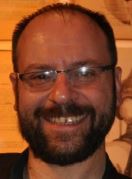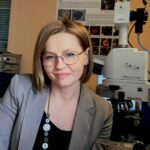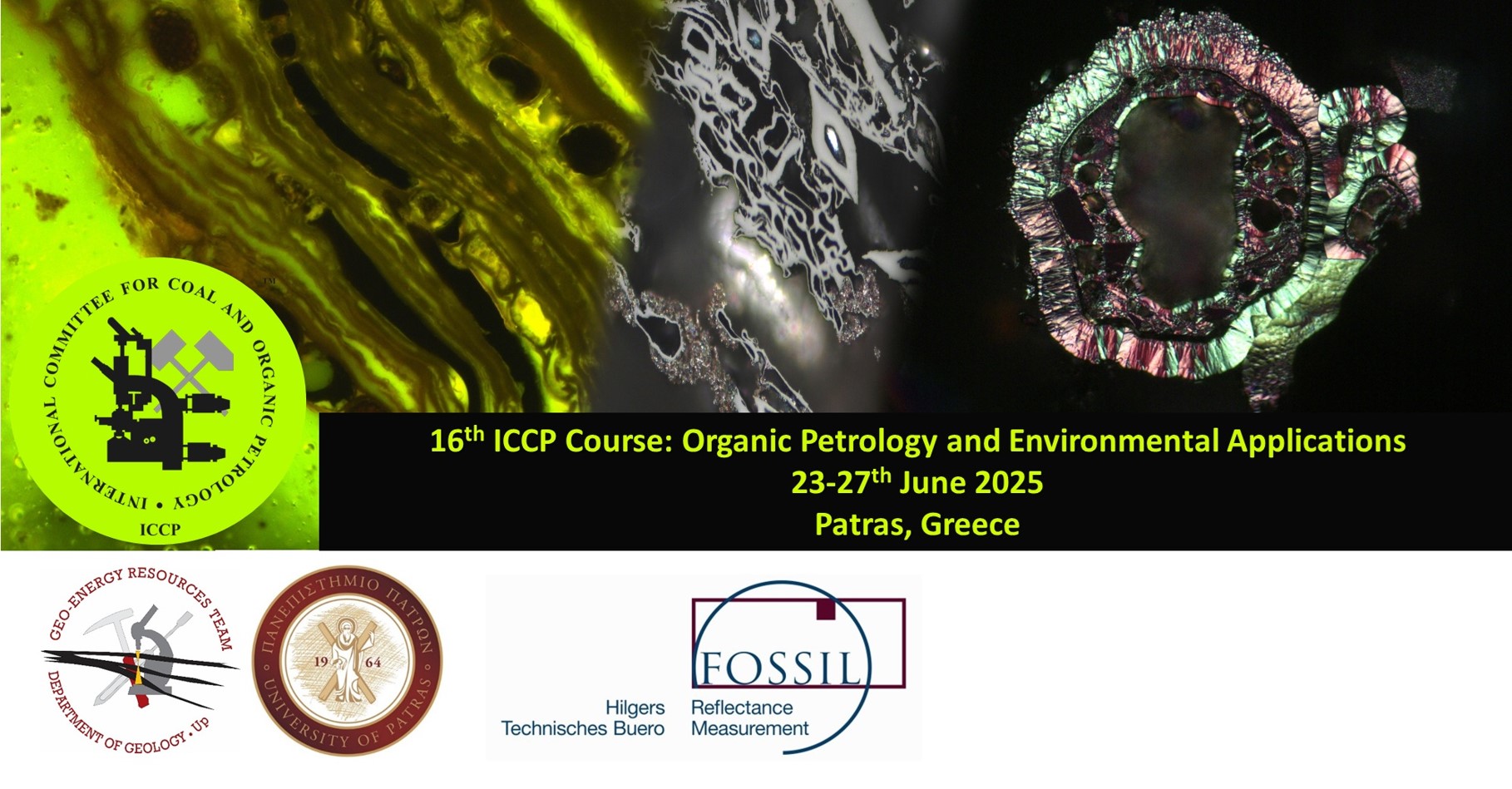16th ICCP Course: Organic Petrology and Environmental Applications, Patras, Greece, 2025
| January 14, 2025 | Filled under Courses, News |
|
1. Introduction
The International Committee for Coal and Organic Petrology (ICCP), in conjunction with the Department of Geology, University of Patras, is pleased to announce a training course in Organic Petrology and Environmental Applications to be held in Patras, Greece between 23-27th June 2025.
The course is centered on the application of standard organic petrography techniques in environmental science, with emphasis on the cycle of organic-based microscopic components from the lithosphere, to the anthroposphere and from there to the hydro- and the atmosphere. The course is structured in two major units, one covering the petrographic classification and identification of industrial and manufactured materials, which are either composite carbon materials useful in other industrial or domestic applications (e.g. coke, biochar, charcoal, activated carbon, graphite etc.) or are by-products of industrial activities (e.g. flyash char, fuel refuse), and the thermochemical transformations involved during the formation of those materials. The second unit covers the petrography of organic matter in environmental samples, where a large heterogeneity in the composition occurs. For this reason, and in order to facilitate the attendees to better understand the classification, identification and quantitative interpretation of organic matter in environmental samples with emphasis on the basic distinction between natural and anthropogenic organic matter, the coal maceral group classifications, including low-rank macerals will be also briefly covered. Source appointment of microscopic organic components, their fate in the environment, their importance in the carbon cycle and carbon capture practices, and in the development of remediation strategies of contaminated sites will also be discussed.
The course is designed for professionals and students, and is not exclusively targeting organic petrologists but also those, who rather deal with petrographic data and/or environmental proxies.
Instructors will be Dr. George Siavalas and Dr. Eng. Małgorzata Wojtaszek- Kalaitzidi, with the participation of Dr. Stavros Kalaitzidis.
2. Course outline
The course will be held daily (23-27th June) from 9:00 a.m. until 5:00 p.m., with breaks for morning and afternoon coffee/tea, and lunch.
The course will cover the following topics:
Theory sessions:
- Introduction to environmental science, scope, definitions
- Industrial processes as a source of anthropogenic particles
- Sample types, sampling strategies, sample collection, sample preparation & analytical techniques.
- Petrography of industrial & manufactured materials; environmental concerns & applications. Classifications and methods.
- Petrography of organic matter in soils and recent sediments.
- Petrography of natural organic matter
- Petrography of fossil organic matter
- Petrography of carbonized organic matter
- Tracing contamination sources, mitigation strategies and monitoring;
- Application of organic petrography in carbon capture practices and nature-based solutions including petrography of biochars
- Other environmental applications
- Case studies.
Practice sessions:
- Sample collection and preparation
- Incident light microscopy sessions on
- Industrial materials
- Manufactured materials
- Feedstock
- Soil and recent sediment organic matter
Emphasis will be given to practical exercises. Practical session facilities will be provided by Laboratory of Economic Geology, Department of Geology, UP, using a microscope coupled to an image projector equipped with the HILGERS FOSSIL software for reflectance measurement.
3. Registration and fees
Registration is available
Costs for the course include course notes, lunches and coffee-breaks. Cost for the course excludes travel, accommodation and meals other than during the course. The number of participants is limited to 20.
Due date for registration and payment is May 31st, 2025. A detailed outline of the course will be available on the website closer to the course.
Company / Professional: 1300 €
Government / Non-Profit: 750 €
Student: 250 €
Pay either by Bank Transfer to:
Bank Name: Commonwealth Bank of Australia Address: 48 Martin Place, Sydney, NSW 2000, Australia
Account Name: International Committee for Coal and Organic Petrology BSB: 064107
Account Number: 10409339 Swift Code: CTBAAU2S
Reference: your surname and 16th ICCP Course.
Or Contact ICCP’s Treasurer Dr. Joan Esterle j.esterle@uq.edu.au for Credit card payments. Receipt will be sent upon payment.
4. Accommodation
Participants will have to arrange their own accommodation. However, the organizers arranged special prices with the following Hotels:
-
-
- Castello Hotel (https://castellohotel.gr/) in walking distance to the Venue (single 65€, double 90€, plus Accommodation tax; please quote code 16th ICCP Course in your correspondence).
- Moxy Patra Marina (https://moxy-hotels.marriott.com/; reservations@moxypatra.com) in city center (please quote code 16th ICCP Course in your correspondence or you will find the information for your online reservation link in Book your group rate for 16th ICCP Course) .
-
For any assistance please contact Dr. Stavros Kalaitzidis (skalait@upatras.gr).
5. Venue
Conference and Cultural Centre, University of Patras University Campus, 26504 Rio-Patras, Greece.
Please note the University Campus is located about 7 km from the city center. There are regular buses and the cost of a taxi is about 8 Euros one way (about 15 – 20 min drive).
6. Trainers
 Dr. George Siavalas
Dr. George Siavalas
Dr. George Siavalas is a geologist by background specialized in the petrographic description of sedimentary organic matter, including anthropogenic organic matter. He graduated from the Department of Geology, University of Patras, Greece, in 2003 and received his MSc. and PhD honours from the same Department in 2005 and 2013, respectively. During his PhD research he studied the composition of organic matter in soils and recent sediments near industrial facilities in order to identify the sources and fate of particulate organic matter in these environments. Since 2013 he is employed with Shell Global Solutions International actively working on the petrography of dispersed organic matter in sedimentary rocks and recently involved in the application of organic petrography in carbon capture practices. He is a co-convener of the “Environmental Applications of Organic Petrology” WG in ICCP since 2016, and has co-authored over 20 articles in peer-reviewed journals and numerous contributions to conferences and technical workshops.

Dr. Eng. Małgorzata Wojtaszek- Kalaitzidi
Dr. Eng. Małgorzata Wojtaszek-Kalaitzidi is a Chemical Technology Engineer and received her Ph.D. in 2015 from AGH University of Science and Technology in Cracow, Poland. Since 2007 she is employed in the Institute of Energy and Fuels Processing Technology. Małgorzata has over 17 years of R&D experience in coke-making technologies, solid fuels and wastes quality assessment and processing technologies, organic petrology of fossil fuels, chars of various materials including wastes and biomass; thermally and chemically altered materials; coke; electrode material; combustion products; petroleum products; environmental samples. Her scientific career is related to raw materials quality assessment. She has been involved in assessing the quality of coking coals from Polish mines, as well as imported from all over the world, being used by the Polish coke-making industry. She has a wide spectrum of collaborations with Polish and European scientific institutions and industry, as well as European Universities and Coking Plants. From 2010 Małgorzata has been the convener of the Coke Petrography and Carbon Materials ICCP-WG, and the organiser of ICCP’s Accreditation Program in Coal Blends.
7. Walter Pickel Student Travel Grant
Applications for the Walter Pickel Student Travel Grant to attend the Patras 2025 Course are now open.
For further Information please contact
Prof. Dr. João Graciano Mendonça Filho at graciano@geologia.ufrj.br or
Prof. Dr. Stavros Kalaitzidis skalait@upatras.gr

